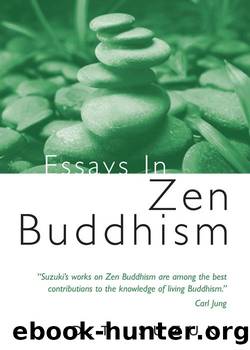Essays in Zen Buddhism, First Series by D.T. Suzuki

Author:D.T. Suzuki
Language: eng
Format: mobi
Publisher: Souvenir Press
Published: 2011-01-03T00:00:00+00:00
‘While living, one sits up and lies not,
When dead, one lies and sits not;
A set of ill-smelling skeleton!
What is the use of toiling and moiling so?’
This shows exactly where Hui-nêng stands in relation to his rival Shên-hsiu, who is so taken up with the practical details of the process of Zen. Those two gāthās inscribed on the monastery wall at Yellow Plum Mountain while they were yet under the tutorship of Hung-jên, are eloquent enough to bring out the characteristic features of the two schools.23
When Hui-nêng further asked the monk from the north as to the teaching of his teacher in regard to morality (śīla), meditation (dhyāna), and wisdom (prajñā), the monk said, ‘According to my master Hsiu, morality consists in not doing anything that is bad; wisdom in reverently practising all that is good; and meditation in purifying the heart.’ Replied Hui-nêng: ‘My view is quite different. All my teaching issues from the conception of Self-nature, and those who assert the existence of anything outside it betray their ignorance of its nature. Morality, Meditation, and Wisdom—all these are forms of Self-Nature. When there is nothing wrong in it, we have morality; when it is free from ignorance, it is wisdom; and when it is not disturbed, it is meditation. Have a thorough understanding once for all as to the being of Self-Nature, and you know that nothing dualistic obtains in it; for here you have nothing to be particularly distinguished as enlightenment, or ignorance, or deliverance, or knowledge, and yet from this nothingness there issues a world of particulars as objects of thought. For him who has once had an insight into his own Nature, no special posture as a form of meditation is to be recommended; everything and anything is good to him, sitting, or lying, or standing. He enjoys perfect freedom of spirit, he moves along as he feels, and yet he does nothing wrong, he is always acting in accord with his Self-Nature, his work is play. This is what I call “the seeing into one’s own Nature”; and this seeing is instantaneous as much as the working is, for there is no graduating process from one stage to another.’
Download
This site does not store any files on its server. We only index and link to content provided by other sites. Please contact the content providers to delete copyright contents if any and email us, we'll remove relevant links or contents immediately.
The remains of the day by Kazuo Ishiguro(7542)
Tools of Titans by Timothy Ferriss(6935)
The Black Swan by Nassim Nicholas Taleb(6184)
Inner Engineering: A Yogi's Guide to Joy by Sadhguru(5887)
Giovanni's Room by James Baldwin(5871)
The Way of Zen by Alan W. Watts(5790)
The Six Wives Of Henry VIII (WOMEN IN HISTORY) by Fraser Antonia(4784)
The Power of Now: A Guide to Spiritual Enlightenment by Eckhart Tolle(4749)
Astrophysics for People in a Hurry by Neil DeGrasse Tyson(4614)
Asking the Right Questions: A Guide to Critical Thinking by M. Neil Browne & Stuart M. Keeley(4566)
12 Rules for Life by Jordan B. Peterson(3724)
The Ethical Slut by Janet W. Hardy(3494)
Skin in the Game by Nassim Nicholas Taleb(3456)
Housekeeping by Marilynne Robinson(3396)
The Art of Happiness by The Dalai Lama(3378)
Double Down (Diary of a Wimpy Kid Book 11) by Jeff Kinney(3267)
Skin in the Game: Hidden Asymmetries in Daily Life by Nassim Nicholas Taleb(3259)
Walking by Henry David Thoreau(3227)
12 Rules for Life: An Antidote to Chaos by Jordan B. Peterson(3196)
